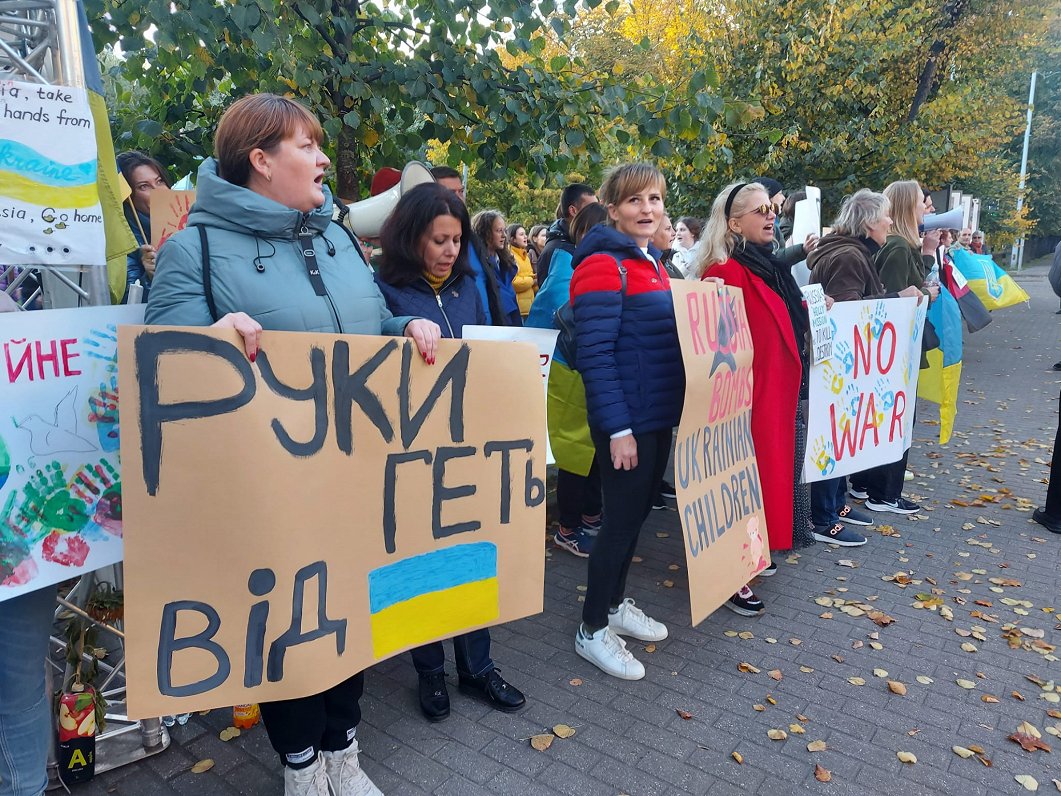According to the magazine, although Russian President Vladimir Putin's ranking among Latvian Russians has fallen even further, Latvian society still holds completely opposite views regarding the war.
Among Latvian-speaking families, 78% support Ukraine, while only 27% among Russian-speaking families support Ukraine.
In mixed families speaking both Latvian and Russian, support for Ukraine has fallen significantly during the year - from 45% in April last year to 32% in April this year, and a similar trend is revealed on many issues - those in the family speaking in both languages have more closely approached the Russian-speaking positions.
The only topic on which there is a great consensus in all three groups is that the majority think that Latvian attitudes towards Russian-speaking residents of Latvia have deteriorated since the Russian invasion of Ukraine. A year ago, just over 40% thought so, but now more than 60%, according to data from the study.
Kopš Krievijas iebrukuma Ukrainā latviešu attieksme pret krieviski runājošajiem pasliktinājusies, rāda Latvijas sabiedrības viedokļa izpēte. Kuri atbalsta ukraiņus, kuri krievus, kā mainījies Putina reitings - lasi žurnāla IR rakstā: https://t.co/rXvULTuLqV pic.twitter.com/K3O0CerHnJ
— Žurnāls IR (@irLV) July 13, 2023
The head of the Ebert Foundation in the Baltic States, Reinhard Krumm, concludes that the Russians in Latvia have encountered three major problems over the last year – the war in Ukraine, Latvia's response to it, as well as Russia's political separation from Europe.
It's a hard pill to swallow, he indicated, but the data show that the Russian-speaking people either don't want to deal with it or still feel close ties with Russia. As a result, the ethnic divide in Latvia does not diminish.
“We don't have any recommendations what to do. However, this situation is a challenge for Latvia's security and, consequently, the security of Europe and NATO, so we would like to point this out,” Krumm said.
The magazine also reports that among mixed families support for Latvia's membership in NATO and the European Union and for the reception of Ukrainian refugees and sanctions against Russia has diminished, while concerns about ethnic conflict have increased, as well as about a potential revival of fascism in Latvia.
Krumm concedes that this could be a psychological response to Latvia's internal political response to the war: “If you decide to demolish monuments, they decide to emphasize their Russian nature.”
The survey shows that a total of 73% of Russian-speaking and 55% of mixed family representatives do not support the Saeima's decision in May last year to demolish the monument at Uzvaras Park and other remnants of Soviet power while 59% of Latvians agree with it. Neutral attitude is indicated by 17% of the Russian speakers.
At the same time, support for Latvia's membership in NATO has increased from 21% to 28% among Latvian Russians, while mixed families indicate a drop from 42% to 35%, and among Latvians, there is also a decrease from 81% to 79%.
Putin's circle of fans has also shrunk. Last April, 22% of Russians indicated they liked Russia and Putin's policies, but this year it is 16%, while most (50%) chose the answer “I like Russia but don't like Putin's policies”.
There has been a slight decline in confidence in the Kremlin media, which is still regarded as objective by 14% of Latvian Russians, (17% a year ago).
79% of Latvians regard Russia as the main initiator of the war. Among Russian speakers, 32% think Russia is the main aggressor, whereas 28% think it is the USA.
The study, which is published in "Ir" on Thursday, was conducted by interviewing more than 2,000 respondents aged 18-75 in April.






























